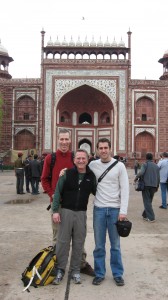“From Chippewa Falls, WI to India –
My Experience with the Combat Blindness Foundation”
Report by Dr. Holm:

In February 2007, Dr. Steve Sauer, Dr. Suresh Chandra, myself and my son Joseph visited Delhi and the province of Rajasthan in northern India. We had the opportunity to visit the Shroff Charity Eye Hospital in Delhi and journeyed to Alwar to see the satellite clinic for eye surgery and eye care that is sponsored by the Combat Blindness Foundation (CBF).
Already in place was a core network of excellent eye surgeons with whom we could exchange ideas and introduce our thoughts and some newer concepts. The true” mission” for me was to understand the tremendous need in India for services to help those blinded by cataracts.
The facilities at the Shroff Charity Eye Hospital were staffed by extraordinarily bright and compassionate medical doctors, but the equipment was only adequate and there were not enough physicians to serve the needs of the poor people blinded by cataract and other eye diseases. (There are approximately 6 million people blinded from cataracts in India). These ophthalmologists work steadily in clinics and operating rooms six full days a week with donated equipment, some of which were reused after sterilization. Their work did not suffer because of this; it was as good or better than the skills I have seen in the United States, but there was just not enough help and material for all those in need.
I was impressed by the ophthalmologists’ level of dedication to the poor, who were treated with kindness and dignity. With us, they were so patient and generous with their time that I almost felt uncomfortable, as I don’t like to be spoiled or coddled, and I didn’t want to take time away from patient care.
As I understand it, the hospital needs to become self-sustainable and needs to establish an outstanding reputation in the community that they serve. Even among the poor, pure Charity hospitals can sometimes be considered inferior to private hospitals.
The need to become an outstanding hospital requires the need for an improvement in its infrastructure in the form of books, equipment, and recruitment of more ophthalmologists. CBF has made a commitment to help the hospital achieve these goals. As part of the team that visited the Shroff Charity Eye Hospital, I have a better understanding of the need and will try to help them accomplish it with my time and monetary contributions.
The Alwar clinic and surgery hospital was a concrete example of CBF’s commitment to help those blinded by cataracts. It was created and improved through a partnership with CBF. In this town of approximately 50,000, there is only one ophthalmologist who does ten cataract surgeries in the morning and then has a full clinic all afternoon. He does this six days a week and is on call for traumatic eye injuries at night.
He does his job well and with few complaints. Another ophthalmologist (at least), is needed to help him. (Eau Claire, Wisconsin, a town of approximately 50,000, has 11 ophthalmologists to take care of the same population). CBF is trying to help provide him with another ophthalmologist and with equipment needed to try to double the surgical output of this facility.
The need in India and other developing countries is almost beyond our comprehension. The mission is to help as many people as possible by improving and expanding hospitals like the Shroff Charity Eye Hospital.
India is a place of stark contrast. Poverty is not as compartmentalized as it is in the United States. It is apparent in most places you go, and it is extreme. To see children filling water bottles in mud puddles with no shelter other than tents constructed on tarps, cardboard, and scrap wood, was heartbreaking. Children begging for food, sometimes missing a hand or foot, or tapping at your car window at a red light, and then driving to see the Taj Mahal in all its splendor, causes extreme distress to the central nervous system of anybody who witnesses this. My son and I decided to devote our conversations on how to help those people with the tools we had available to us.
Having said this, the countryside is a stark contrast to the slums surrounding the city. It was beautiful. Miles and miles of wheat and mustard, flocks of parrots, women dressed in colorful saris tending the fields. Camels walking along the side of the roads, carrying their loads to market and elsewhere, Peacocks in trees and monkeys on balconies. But perhaps the most beautiful thing of all was the gentle demeanor of the people who had nothing. They were tolerant and patient, grateful for help, but also anxious to try and procure it. CBF is helping these people, to procure that aide, and I am proud to be a part of that attempt.
